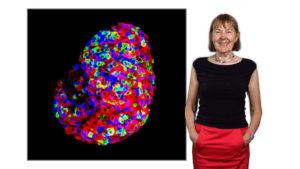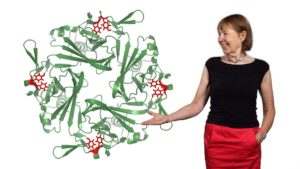Professor Dame Frances Ashcroft is the GlaxoSmithKline Royal Society Research Professor in the Department of Physiology, Anatomy and Genetics, and a Fellow of Trinity College, at the University of Oxford.
Ashcroft received her BA and PhD degrees from Cambridge University and was a post-doctoral fellow at Leicester University and the University of California, Los Angeles. When she set up her own lab at Oxford, Ashcroft began to study how a rise in blood sugar levels leads to the release of insulin from the pancreatic beta cells, and what goes wrong with this process in diabetes. Ashcroft’s more recent research has focused on neonatal diabetes, a rare genetic form of the disease that typically develops soon after birth. Together with her colleagues, she has shown that mutations in an ATP-sensitive potassium channel in the plasma membrane are responsible for this disease. Understanding the mechanism of action of this potassium channel has allowed many patients to switch from insulin injections to oral drug therapy. In addition, insights gained from the study of neonatal diabetes have implications for the understanding and treatment of type 2 diabetes, a much more common disease.
Ashcroft was elected a Fellow of the Royal Society in 1999 and in 2012 she was the European Laureate for the L’Oréal-UNESCO Women in Science Award. Learn more about Ashcroft’s research here.






